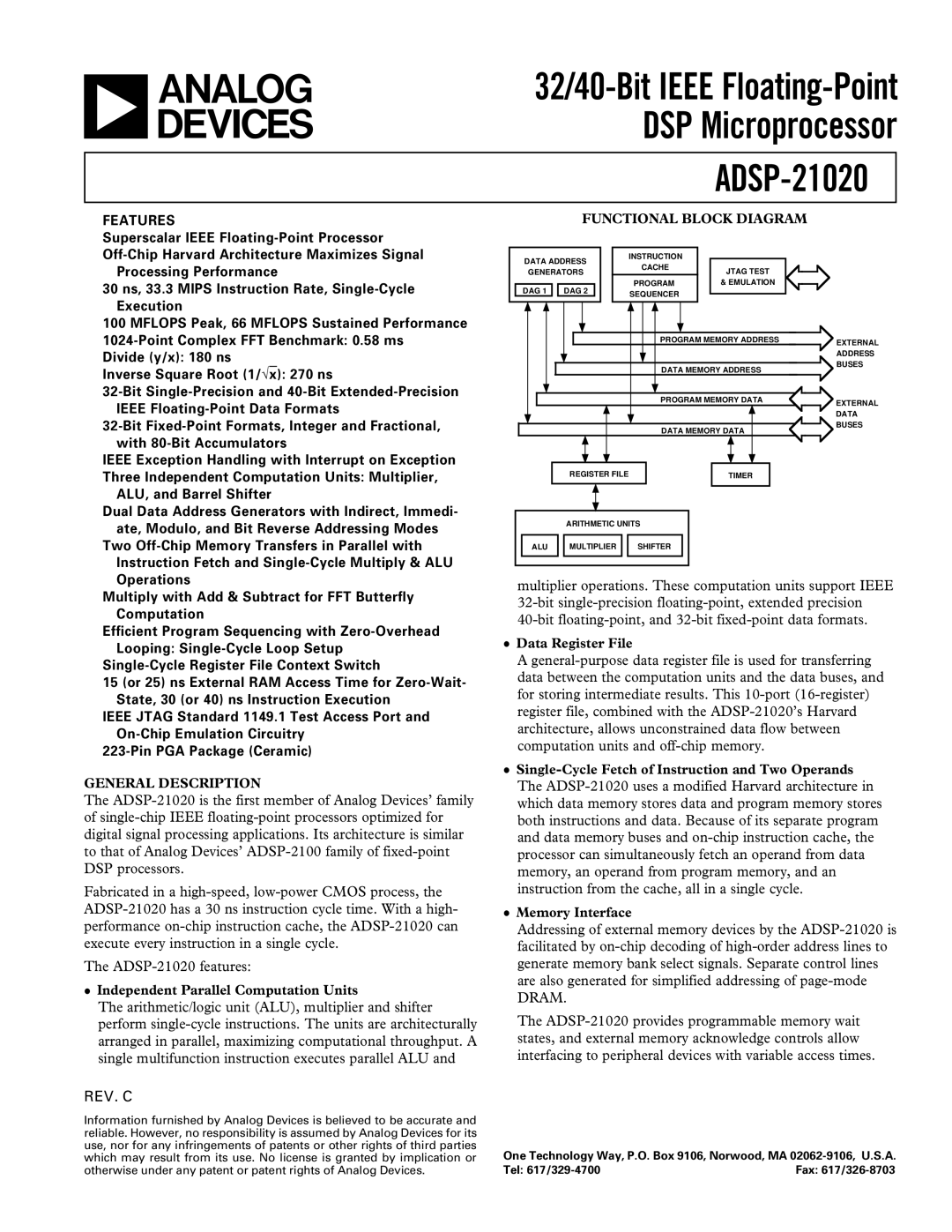IEEE Exception Handling with Interrupt on Exception Three Independent Computation Units: Multiplier,
ALU, and Barrel Shifter
Dual Data Address Generators with Indirect, Immedi- ate, Modulo, and Bit Reverse Addressing Modes
Two Off-Chip Memory Transfers in Parallel with Instruction Fetch and Single-Cycle Multiply & ALU Operations
Multiply with Add & Subtract for FFT Butterfly Computation
Efficient Program Sequencing with Zero-Overhead Looping: Single-Cycle Loop Setup
Single-Cycle Register File Context Switch
15(or 25) ns External RAM Access Time for Zero-Wait- State, 30 (or 40) ns Instruction Execution
IEEE JTAG Standard 1149.1 Test Access Port and
On-Chip Emulation Circuitry
223-Pin PGA Package (Ceramic)
GENERAL DESCRIPTION
The ADSP-21020 is the first member of Analog Devices’ family of single-chip IEEE floating-point processors optimized for digital signal processing applications. Its architecture is similar to that of Analog Devices’ ADSP-2100 family of fixed-point DSP processors.
Fabricated in a high-speed, low-power CMOS process, the ADSP-21020 has a 30 ns instruction cycle time. With a high- performance on-chip instruction cache, the ADSP-21020 can execute every instruction in a single cycle.
The ADSP-21020 features:
•Independent Parallel Computation Units
The arithmetic/logic unit (ALU), multiplier and shifter perform single-cycle instructions. The units are architecturally arranged in parallel, maximizing computational throughput. A single multifunction instruction executes parallel ALU and
REV. C
Information furnished by Analog Devices is believed to be accurate and reliable. However, no responsibility is assumed by Analog Devices for its use, nor for any infringements of patents or other rights of third parties which may result from its use. No license is granted by implication or otherwise under any patent or patent rights of Analog Devices.
| | | | REGISTER FILE | | | | | TIMER |
| | | | | | | | | | |
| | | | | | | | | | | |
| | | | ARITHMETIC UNITS | | |
| | | | | | | | | | | |
| ALU | | MULTIPLIER | | | SHIFTER | | | |
| | | | | | | | | | | |
| | | | | | | | | | | |
multiplier operations. These computation units support IEEE 32-bit single-precision floating-point, extended precision
40-bit floating-point, and 32-bit fixed-point data formats.
•Data Register File
A general-purpose data register file is used for transferring data between the computation units and the data buses, and for storing intermediate results. This 10-port (16-register) register file, combined with the ADSP-21020’s Harvard architecture, allows unconstrained data flow between computation units and off-chip memory.
•Single-Cycle Fetch of Instruction and Two Operands The ADSP-21020 uses a modified Harvard architecture in which data memory stores data and program memory stores both instructions and data. Because of its separate program and data memory buses and on-chip instruction cache, the processor can simultaneously fetch an operand from data memory, an operand from program memory, and an instruction from the cache, all in a single cycle.
•Memory Interface
Addressing of external memory devices by the ADSP-21020 is facilitated by on-chip decoding of high-order address lines to generate memory bank select signals. Separate control lines are also generated for simplified addressing of page-mode DRAM.
The ADSP-21020 provides programmable memory wait states, and external memory acknowledge controls allow interfacing to peripheral devices with variable access times.
One Technology Way, P.O. Box 9106, Norwood, MA 02062-9106, U.S.A.
Tel: 617/329-4700 | Fax: 617/326-8703 |

![]()
![]() DAG 2
DAG 2